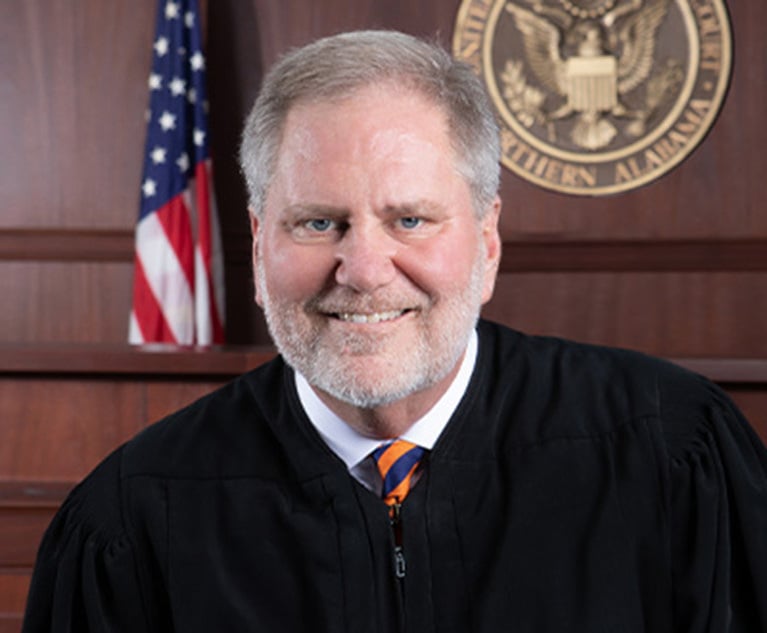'Bull' Shows the Perils of Confirmation Bias
Did CBS hire a new team of writers for "Bull" this season? I hate to jinx anything, but the S4 episodes have actually had quasi-plausible storylines.…
October 30, 2019 at 04:55 PM
6 minute read
Did CBS hire a new team of writers for "Bull" this season? I hate to jinx anything, but the S4 episodes have actually had quasi-plausible storylines. What is happening?
I don't know, but I can tell you what is not happening: jury consulting. Or not much of it, at least. And I have to admit, the lack of jury consulting absurdities is making my job as a columnist more challenging. But who doesn't like a challenge?
This week we're introduced to a billionaire businesswoman named Rachel Thomas and her husband, Peter, as they drink wine – and argue – on their boat. Rachel muses that she'd like nothing more than to "bash him over the head with the fire extinguisher." Ah, marriage.
When Rachel wakes up the next morning, we learn she cannot find her husband. She ventures out to the boat and discovers a missing fire extinguisher, blood on the side of the boat, and no sign of Peter.
A few hours later, we observe Rachel, Dr. Bull and Benny Colón around the conference table in her office. She had already called the police, had already been questioned, and a forensics team was gathering evidence as they were talking. Rachel has yet to be arrested, charged or even indicted. Points for being proactive, I suppose.
Benny, as usual, is reluctant to take the case, but Bull goes all-in on a belief that Rachel is too methodical and careful to be so reckless and sloppy. She is ultimately charged with second-degree murder of her husband, and because it's Hollywood, she goes to trial a week later.
Actual Jury Consulting!
There are about three seconds of script where Bull does anything resembling typical jury consulting:
- 1st second: Bull opines that jurors who let their emotions get the better of them will not have a hard time believing that Rachel killed her husband. When Benny and Bull "accepted" a juror who would go the mat fighting for a cab, I can't help but think they just sat the very juror they thought would find their client guilty. Can't say I would have made that same recommendation.
- 2nd second: Bull has an honest conversation with Rachel about her emotions, or lack thereof. He expresses concern that she doesn't look sad, shocked or the least bit upset that the man she claims she didn't kill was taken from her just days ago. He encourages her to muster up some feeling so jurors will think she gives a damn. This is true to form because we jury consultants are often talking to witnesses and/or clients about the disconnect between their message and their body language.
- 3rd second: After closing arguments, Bull tells Rachel he's made it "a policy not to speculate about verdicts before juries actually announce them…". Of course, Bull went on to break his own policy, but that's beside the point. The policy is a great one I try to follow. In fact, I rarely stick around during deliberations unless the client requests it. Everyone tries to read the tea leaves, but a jury is rarely if ever a homogeneous group of folks who all think alike. A jury is (typically) comprised of 12 unique individuals who bring their own world views, experiences, expectations and perceptions into the deliberation room. Juries will do the best they can with the tools they are given. Sometimes, we think they get it right, sometimes we don't.
Avoiding Confirmation Bias
Normally, I provide y'all with a play-by-play of the episode, but this week I'm going to skip all of that and jump to one scene worth talking about. It's a bit of a spoiler, so SPOILER ALERT.
Toward the very end of the trial, Bull, et al. discovers a piece of evidence that gives everyone hopes of an acquittal. And for once, the evidence isn't discovered by a team of Trial Analysis Corporation sleuths. It's actually discovered in plain sight in the evidence locker — why the trial team waited until the end of trial to examine this stuff is beyond me, but at least they finally got it done They found a seemingly inconsequential "bag inside an evidence bag" with traces of lime, lipstick, an eyelash and sputum. Rachel's sputum.
Benny puts on their forensic expert who was personable, likeable and credible. During direct, Benny asks why none of the prior witnesses talked about the "bag inside a bag." The witness testifies, "I can't answer that, but it appears that even though the bag was submitted for lab testing, nobody drilled down on the results because a plastic produce bag didn't figure into the narrative that police had come up with."
This answer is pure gold from a jury-level because it raises questions about the thoroughness of the police investigation and whether the prosecution put the proverbial cart before the horse.
At its core, this is really about confirmation bias, the tendency to search for and interpret data that is consistent with what we already believe to be true (or likely true), and to reject or ignore data that challenges what we feel to be true. We see this during every election cycle, but confirmation bias is alive and well in the world of litigation, too.
We're all susceptible to confirmation bias: judges, juries, experts and even attorneys. It can come into play when crafting RFPs, developing case strategy, preparing key witnesses or even choosing whether to strike a particular juror. If these decisions are made based on what we want to be true, without fully evaluating evidence or facts to the contrary, confirmation bias can skew the process of preparing for trial – and prove to be a fatal error.
In this episode of "Bull," confirmation bias prevented investigators from seeing evidence that led to Rachel's eventual acquittal on the murder charge. Turns out, her husband had tried to kill her by suffocating her with a produce bag, and she killed him in self-defense, only she didn't remember any of it because she has early-onset Alzheimer's, something she had kept secret lest it doom her career.
The show's writers may be veering away from giving me much to chew on, jury consulting-wise, but I'll take it if all the episodes are as good as this one.
Kacy Miller, president of CourtroomLogic Consulting LLC, will provide weekly reviews of new episodes of CBS' "Bull," about an elite trial consulting firm. Miller began her career as a litigation consultant working alongside Dr. Phil McGraw, the inspiration for "Bull." She can be reached at [email protected].
This content has been archived. It is available through our partners, LexisNexis® and Bloomberg Law.
To view this content, please continue to their sites.
Not a Lexis Subscriber?
Subscribe Now
Not a Bloomberg Law Subscriber?
Subscribe Now
NOT FOR REPRINT
© 2025 ALM Global, LLC, All Rights Reserved. Request academic re-use from www.copyright.com. All other uses, submit a request to [email protected]. For more information visit Asset & Logo Licensing.
You Might Like
View All

Crypto Entrepreneur Claims Justice Department’s Software Crackdown Violates US Constitution
4 minute read
A Judge Ordered Squabbling Lawyers to Have Lunch: Here's What Happened
Trending Stories
- 1Paul Hastings, Recruiting From Davis Polk, Continues Finance Practice Build
- 2Chancery: Common Stock Worthless in 'Jacobson v. Akademos' and Transaction Was Entirely Fair
- 3'We Neither Like Nor Dislike the Fifth Circuit'
- 4Local Boutique Expands Significantly, Hiring Litigator Who Won $63M Verdict Against City of Miami Commissioner
- 5Senior Associates' Billing Rates See The Biggest Jump
Who Got The Work
J. Brugh Lower of Gibbons has entered an appearance for industrial equipment supplier Devco Corporation in a pending trademark infringement lawsuit. The suit, accusing the defendant of selling knock-off Graco products, was filed Dec. 18 in New Jersey District Court by Rivkin Radler on behalf of Graco Inc. and Graco Minnesota. The case, assigned to U.S. District Judge Zahid N. Quraishi, is 3:24-cv-11294, Graco Inc. et al v. Devco Corporation.
Who Got The Work
Rebecca Maller-Stein and Kent A. Yalowitz of Arnold & Porter Kaye Scholer have entered their appearances for Hanaco Venture Capital and its executives, Lior Prosor and David Frankel, in a pending securities lawsuit. The action, filed on Dec. 24 in New York Southern District Court by Zell, Aron & Co. on behalf of Goldeneye Advisors, accuses the defendants of negligently and fraudulently managing the plaintiff's $1 million investment. The case, assigned to U.S. District Judge Vernon S. Broderick, is 1:24-cv-09918, Goldeneye Advisors, LLC v. Hanaco Venture Capital, Ltd. et al.
Who Got The Work
Attorneys from A&O Shearman has stepped in as defense counsel for Toronto-Dominion Bank and other defendants in a pending securities class action. The suit, filed Dec. 11 in New York Southern District Court by Bleichmar Fonti & Auld, accuses the defendants of concealing the bank's 'pervasive' deficiencies in regards to its compliance with the Bank Secrecy Act and the quality of its anti-money laundering controls. The case, assigned to U.S. District Judge Arun Subramanian, is 1:24-cv-09445, Gonzalez v. The Toronto-Dominion Bank et al.
Who Got The Work
Crown Castle International, a Pennsylvania company providing shared communications infrastructure, has turned to Luke D. Wolf of Gordon Rees Scully Mansukhani to fend off a pending breach-of-contract lawsuit. The court action, filed Nov. 25 in Michigan Eastern District Court by Hooper Hathaway PC on behalf of The Town Residences LLC, accuses Crown Castle of failing to transfer approximately $30,000 in utility payments from T-Mobile in breach of a roof-top lease and assignment agreement. The case, assigned to U.S. District Judge Susan K. Declercq, is 2:24-cv-13131, The Town Residences LLC v. T-Mobile US, Inc. et al.
Who Got The Work
Wilfred P. Coronato and Daniel M. Schwartz of McCarter & English have stepped in as defense counsel to Electrolux Home Products Inc. in a pending product liability lawsuit. The court action, filed Nov. 26 in New York Eastern District Court by Poulos Lopiccolo PC and Nagel Rice LLP on behalf of David Stern, alleges that the defendant's refrigerators’ drawers and shelving repeatedly break and fall apart within months after purchase. The case, assigned to U.S. District Judge Joan M. Azrack, is 2:24-cv-08204, Stern v. Electrolux Home Products, Inc.
Featured Firms
Law Offices of Gary Martin Hays & Associates, P.C.
(470) 294-1674
Law Offices of Mark E. Salomone
(857) 444-6468
Smith & Hassler
(713) 739-1250







